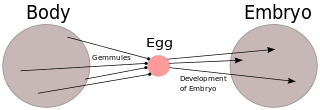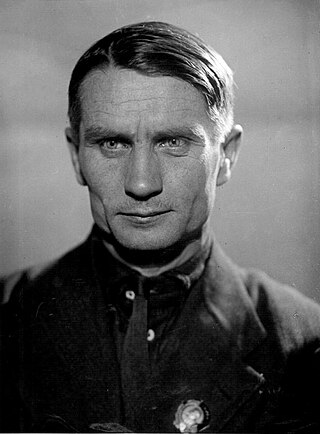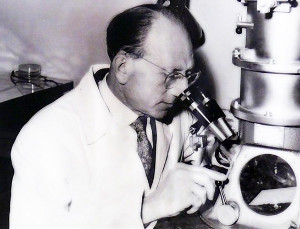
Denis Buican (born Dumitru Buican-Peligrad; 21 December 1934 in Bucharest) is a Romanian-French scientist, bilingual writer, biologist, philosopher and a historian of science. He has studied genetics. [1]

Denis Buican (born Dumitru Buican-Peligrad; 21 December 1934 in Bucharest) is a Romanian-French scientist, bilingual writer, biologist, philosopher and a historian of science. He has studied genetics. [1]
His father Dumitru Peligrad a boyar and philanthropist was placed under house arrest after the invasion of Romania by the Red Army (starting 23 August 1944), but he refused to submit to regular police checks. Although belonging to a class deemed "unhealthy" by the then communist regime, the young researcher was a brilliant undergraduate at the University of Bucharest.
Pioneer of Romanian radio-genetics (his first studies focused on the influence of electricity on the life of plants), agronomist (1956), Doctor (Ph.D.) in Genetics (1961), then a professor at the University of Bucharest, he fought theories of Lysenkoism, imposed by the ex-USSR in the former so-called "popular democratic" countries of Central and Eastern Europe. After 1948 his laboratories were destroyed three times and he was banned from the university in the late 1950s.
In his first book, published in Romanian, in 1969, General Biology, Genetics and Improvement, Denis Buican did not hesitate to formally confront Lysenkoism amidst repressive political and social campaigns undertaken in science and agriculture by the powerful Stalinist director Trofim Lysenko and his followers, starting year 1920.
Naturalized French in 1972, he undertook a work of history and philosophy of science, embodied by his thesis of Doctor (Ph.D.) of State (1983), History of Genetics and Evolutionism in France, the first true history of this science published in France. In 1989, his book The Revolution of Evolution received a Grand Prize from the French Academy. In 1997, he presided over the "Biology and Medical Science" section of the twentieth International Congress of History of Science (Liege, Belgium).
Professor of history of science at the French University of Paris X-Nanterre (1983–2003), he is the author of a new theory of evolution, the "Synergistic Theory of Evolution".
A writer in Romanian and French, Denis Buican has published several collections of poems, in sensitivity close to poems written by Romanian poets Mihai Eminescu, Lucian Blaga and Tudor Arghezi. Haunted by nothingness, these short poems, very dense, open up a universe that is not unlike that of Romanian philosopher Emil Cioran.
In 1955 he founded the first radiobiology laboratory of Romania and, the following year, he graduated this university as an agricultural engineer. Fighting tirelessly Lysenkoism's theories (which caused to his lab to be destroyed three times: in 1956, 1960 and 1962), he continues his research on plants' resistance to cold and on the heterosis (or hybrid vigor) for hybrids of Zea mays (the maize). His works, which were initially the subject of a first doctorate (Ph.D.) thesis, in natural science (defended and published in Bucharest, Romania, in 1961), will be extended, completed and introduced, after his arrival in France, in a second doctoral thesis (defended and published at the Faculty of Sciences, in Paris, France, in 1970).
Theorist of biology, Denis Buican has developed a new model called "Synergistic Theory of Evolution". It updates and complements the previous "Synthetic Theory" having in view that the natural selection underlined by Charles Darwin is to be applied only to phenotype, so that certain phenomena (such as lethal mutations) were not sufficiently taken into account by this old model. Buican's theory and model have introduced "a new concept in the evolutionary and hereditary process - i.e the pre-selection genotyping" - which may be defined as "the natural operation which eliminates a priori, to genotype level, any genetic combination or mutation which is unfit for the survival of it" (The revolution of evolution, 1989). Guided by the "Systems Theory" of Ludwig von Bertalanffy, Buican's theory envisages synergistic multi-pole selection which would be able to act within every living (from the atom to human being).
Philosopher and historian of science visiting professor at the Sorbonne University (1969–1974), senior lecturer at the University of Dijon (1974–1980) and at the University of Paris I (1980–1983), Denis Buican teaches Philosophy and History of biological sciences, while preparing a third (state) doctoral thesis on the history of genetics in France, under the direction of Jacques Roger .
Philosopher of sciences, he redefines notably the place of chance in evolution, in departing positions adopted by Jacques Monod: beyond the absolute chance postulated by the Nobel Prize, he introduces an "oriented chance" (called "evolving orthodromic") and considers (in "Chance, necessity and logic of living", La Nouvelle Revue Française , 225, 1971) the opportunities to be offered by genetic manipulation – which will be confirmed by the first genetic engineering work done in 1974.
Denis Buican has also developed a new theory of knowledge, called Biognoséologie, which attempts to exceed the Kantian distinction between phenomena and noumènes (those "things by themselves" which, according to Kant, can not be investigated by human beings) : based on ethology's data and on advances in molecular biology, he considered the so-called "relative noumènes", which would likely capture a probable reality.
Historian, based on the epistemological model of Thomas Kuhn ( The Structure of Scientific Revolutions , 1962), he also considered the introduction of genetics in France as a "run with obstacles": the science of heredity was accepted only in 1945, not without some resistance by biologists themselves, most of them being attached to Néo-lamarckisme . He is also the author of an essay, "The eternal return of Lysenko" (1978) dedicated to the interpretation of Lysenkoism: denouncing the theories of the philosopher Dominique Lecourt (author of the essay Lysenko published in 1976), which denied any liability to Marxism in the emergence then the triumph of Stalin's Lysenkoism theses. On the contrary he shows that the roots of Lysenkoism are to be found in the messianism and determinism of Marx and Engels.
Becoming a professor at University of Paris X – Nanterre, in 1983, Denis Buican devoted most of his research on the history of Darwinism, Evolution and Genetics, he publishes many books.
A free man without illusions about Western democracies - which he did not consider to be truly democratic and readily qualified them as being only "police- and plutocratic demagogies" - he calls, on contrary, for an open, meritocratic society, based on the principles of power separation and reciprocal control of powers (according to Montesquieu), on the respect for the individual value and on equal opportunities. Probabilistic, he wished that the human society will enable everyone to freely and fully develop her/ his hereditary potential. Very critical in respect to the French university system - which he readily denounces as having a clan structure, attitudes and behaviors - he considers that "a society aiming to be simultaneously equitable and efficient does require a selective - and even a micro-selective - educational system being able to offer to everyone, from cradle to the grave, the possibility to develop herself / himself without any discrimination of class or race, of religion or customs, as far as her/ his genetic heritage does allow." (The university as sacred mad cow of the Republic, Paris, F.-X. de Guibert, 2004, p. 127).

Darwinism is a theory of biological evolution developed by the English naturalist Charles Darwin (1809–1882) and others, stating that all species of organisms arise and develop through the natural selection of small, inherited variations that increase the individual's ability to compete, survive, and reproduce. Also called Darwinian theory, it originally included the broad concepts of transmutation of species or of evolution which gained general scientific acceptance after Darwin published On the Origin of Species in 1859, including concepts which predated Darwin's theories. English biologist Thomas Henry Huxley coined the term Darwinism in April 1860.

Natural selection is the differential survival and reproduction of individuals due to differences in phenotype. It is a key mechanism of evolution, the change in the heritable traits characteristic of a population over generations. Charles Darwin popularised the term "natural selection", contrasting it with artificial selection, which is intentional, whereas natural selection is not.

Pangenesis was Charles Darwin's hypothetical mechanism for heredity, in which he proposed that each part of the body continually emitted its own type of small organic particles called gemmules that aggregated in the gonads, contributing heritable information to the gametes. He presented this 'provisional hypothesis' in his 1868 work The Variation of Animals and Plants Under Domestication, intending it to fill what he perceived as a major gap in evolutionary theory at the time. The etymology of the word comes from the Greek words pan and genesis ("birth") or genos ("origin"). Pangenesis mirrored ideas originally formulated by Hippocrates and other pre-Darwinian scientists, but using new concepts such as cell theory, explaining cell development as beginning with gemmules which were specified to be necessary for the occurrence of new growths in an organism, both in initial development and regeneration. It also accounted for regeneration and the Lamarckian concept of the inheritance of acquired characteristics, as a body part altered by the environment would produce altered gemmules. This made Pangenesis popular among the neo-Lamarckian school of evolutionary thought. This hypothesis was made effectively obsolete after the 1900 rediscovery among biologists of Gregor Mendel's theory of the particulate nature of inheritance.
Zoology is the scientific study of animals. Its studies include the structure, embryology, classification, habits, and distribution of all animals, both living and extinct, and how they interact with their ecosystems. Zoology is one of the primary branches of biology. The term is derived from Ancient Greek ζῷον, zōion ('animal'), and λόγος, logos.

Trofim Denisovich Lysenko was a Soviet agronomist and scientist. He was a strong proponent of Lamarckism, and rejected Mendelian genetics in favour of his own idiosyncratic, pseudoscientific ideas later termed Lysenkoism.

The modern synthesis was the early 20th-century synthesis of Charles Darwin's theory of evolution and Gregor Mendel's ideas on heredity into a joint mathematical framework. Julian Huxley coined the term in his 1942 book, Evolution: The Modern Synthesis. The synthesis combined the ideas of natural selection, Mendelian genetics, and population genetics. It also related the broad-scale macroevolution seen by palaeontologists to the small-scale microevolution of local populations.

Jean-Baptiste Pierre Antoine de Monet, chevalier de Lamarck, often known simply as Lamarck, was a French naturalist, biologist, academic, and soldier. He was an early proponent of the idea that biological evolution occurred and proceeded in accordance with natural laws.

Sir Julian Sorell Huxley was a British evolutionary biologist, eugenicist, and internationalist. He was a proponent of natural selection, and a leading figure in the mid-twentieth century modern synthesis. He was secretary of the Zoological Society of London (1935–1942), the first Director of UNESCO, a founding member of the World Wildlife Fund, the president of the British Eugenics Society (1959–1962), and the first president of the British Humanist Association.

Lamarckism, also known as Lamarckian inheritance or neo-Lamarckism, is the notion that an organism can pass on to its offspring physical characteristics that the parent organism acquired through use or disuse during its lifetime. It is also called the inheritance of acquired characteristics or more recently soft inheritance. The idea is named after the French zoologist Jean-Baptiste Lamarck (1744–1829), who incorporated the classical era theory of soft inheritance into his theory of evolution as a supplement to his concept of orthogenesis, a drive towards complexity.

Lysenkoism was a political campaign led by Soviet biologist Trofim Lysenko against genetics and science-based agriculture in the mid-20th century, rejecting natural selection in favour of a form of Lamarckism, as well as expanding upon the techniques of vernalization and grafting.

Giuseppe Sermonti was an Italian professor of genetics. Sermonti is well known for his criticism of natural selection as the deciding factor of human biology.

Dimitrie Cuclin was a Romanian classical music composer, musicologist, philosopher, translator, and writer.
Ivan Ivanovich Schmalhausen was a Russian and later Soviet zoologist and evolutionary biologist of German descent. He developed the theory of stabilizing selection, and took part in the development of the modern evolutionary synthesis.

Pierre-Paul Grassé was a French zoologist, writer of over 300 publications including the influential 52-volume Traité de Zoologie. He was an expert on termites who rejected Neo-Darwinism and was a proponent of Neo-Lamarckism.
Romanian philosophy is a name covering either:

Dominique Lecourt was a French philosopher. He is known in the Anglophone world primarily for his work developing a materialist interpretation of the philosophy of science of Gaston Bachelard.

Evolutionary thought, the recognition that species change over time and the perceived understanding of how such processes work, has roots in antiquity—in the ideas of the ancient Greeks, Romans, Chinese, Church Fathers as well as in medieval Islamic science. With the beginnings of modern biological taxonomy in the late 17th century, two opposed ideas influenced Western biological thinking: essentialism, the belief that every species has essential characteristics that are unalterable, a concept which had developed from medieval Aristotelian metaphysics, and that fit well with natural theology; and the development of the new anti-Aristotelian approach to modern science: as the Enlightenment progressed, evolutionary cosmology and the mechanical philosophy spread from the physical sciences to natural history. Naturalists began to focus on the variability of species; the emergence of palaeontology with the concept of extinction further undermined static views of nature. In the early 19th century prior to Darwinism, Jean-Baptiste Lamarck (1744–1829) proposed his theory of the transmutation of species, the first fully formed theory of evolution.

Remy Chauvin at Sainte-Croix-aux-Mines, Haut-Rhin, was a biologist and entomologist, and a French Honorary Professor Emeritus at the Sorbonne, PhD, and a senior research fellow since 1946. Chauvin was also known for defending the rights of animals and for being interested in such topics as parapsychology, life after death, psychics, clairvoyance and UFOs. He sometimes wrote under the pseudonym Pierre Duval.

This bibliography of biology is a list of notable works, organized by subdiscipline, on the subject of biology.
Isaak (Isay) Izrailevich Prezent was a Soviet philosopher of biology, best known for his work on Marxist methodology of science and as one of the key figures of Lysenkoism.